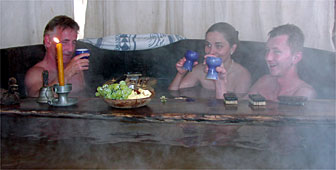Spa looks to Middle Ages to restore health

Leukerbad, which claims to be the largest spa in the Alps, is celebrating its 500th anniversary as a health resort. By dipping into history, its managers hope to cure the spa's current financial ills.
Markedly fewer visitors have visited the resort since the town, located in canton Valais, nearly drowned under huge debts in the late 1990s, a development brought on by unwise investments in grandiose building projects.
Tourism director Peter Salzmann was hired less than a year ago to turn around the spa’s fortunes. He says Leukerbad is slowly getting back on its feet after the difficult financial period, and is again focusing guests’ attention on the curative powers of its thermal waters.
“Three million litres of water comes out of the hot springs here at 51 degrees every day and that was also the case in the Middle Ages,” Salzmann says. “Leukerbad was known by the Romans. It was mentioned in the first books written about European spas.”
Salzmann, who enjoys breakfast, as his medieval predecessors would have done, on a floating tray in the pool, believes Leukerbad’s image can be restored if people are made aware of its historical importance.
Leukerbad’s history as a spa dates back to Roman times, but it wasn’t until 1501 that a powerful medieval bishop, Mathäus Schiner, recognised the economic potential of the thermal waters at the foot of the Gemmi Pass.
Bishop improves spa
Bishop Schiner purchased the rights to use Leukerbad’s hot springs and improved the spa’s infrastructure. He enlarged existing baths, built new ones, and constructed a guesthouse.
Leukerbad began attracting increasing numbers of people, the majority of whom made the long and arduous journey to the resort from northern Switzerland and southern Germany. It ended with the crossing of the Gemmi Pass.
Salzmann and an entourage of costumed guests re-enacted the latter part of the journey by following the centuries’ old trail hewn from the 600 metre high cliffs that separate Leukerbad from the pass.
Once in Leukerbad, the time travellers took part in a medieval festival and invited onlookers to sooth their aches and pains in a large communal wooden tub, as was the custom 500 years ago.
“In former times, it was normal that people spent the whole day or even the whole night in the water,” says historian Gabriele Knoll, adding that some drowned after falling asleep. “It was quite normal that doctors prescribed up to 200 hours in the water.”
Bathers hoped to cure lame limbs and varicose veins and improve the flow of blood through the body. The healing properties of the water were also said to “open the wombs of infertile women”.
Eggs boiled in springs
A typical medieval diet of someone taking a cure in Leukerbad consisted of everything from venison, lean beef and lamb, fish, fresh milk – to eggs cooked in the hot springs. It was all washed down with white wine. Bathers were warned never to drink cold water, which could lead to an unexplained addiction.
“They would eat and drink even though the doctors told them not to consume anything while in the bath,” Knoll adds. “But you can imagine how hard it would have been to spend the whole day in the water without eating or drinking!”
The rules and bathing etiquette were all laid down in guidebooks, such as the warning that the waters would not have the same healing effect if a cure were taken during a leap year or two years after a solar or lunar eclipse. It was also, at the time, inadvisable to make the pilgrimage to Leukerbad following an autumn or spring marked by long periods of changeable weather.
by Dale Bechtel

In compliance with the JTI standards
More: SWI swissinfo.ch certified by the Journalism Trust Initiative

You can find an overview of ongoing debates with our journalists here. Please join us!
If you want to start a conversation about a topic raised in this article or want to report factual errors, email us at english@swissinfo.ch.